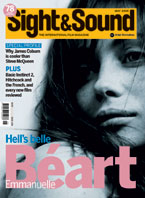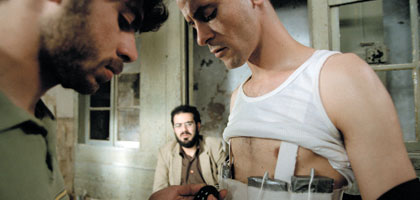
Paradise Now
Netherlands/Israel/Germany/France 2005

Reviewed by Ali Jaafar
Synopsis
Our synopses give away the plot in full, including surprise twists.
Nablus, Palestine, the present. Best friends Saïd and Khaled work in a garage. One of the cars they fix belongs to Suha, the daughter of a man respected for being a Palestinian ‘martyr'. Saïd tries to ignore his and Suha's mutual attraction. Later that evening a Palestinian militant informs Saïd that he and Khaled have been chosen to carry out a suicide bombing in Israel the following day; they both have one last evening to spend with their families.Late at night, Saïd goes to see Suha and tells her his father was killed for collaborating with the Israelis, but he doesn't say anything about the planned suicide operation. The following day, Saïd and Khaled are readied for their mission, and bombs are strapped to their waists. They are taken to a crossing on the border with Israel, but a mix-up results in Saïd and Khaled getting separated. Khaled links up with the other militants, but they cannot find Saïd. As Khaled tries to find Saïd he bumps into Suha. She finds out about their plans and tries to persuade Khaled not to go through with the attack. They find Saïd at his father's grave. The next morning Saïd and Khaled set off once more on their mission. Khaled reveals he doesn't want to go through with it. Saïd pretends to agree with him but at the last moment escapes from Khaled and gets on a bus. The screen fades to white.
Review
At the end of Rana's Wedding, his 2002 film about a young Palestinian woman frantically evading Israeli checkpoints to get to her wedding on time, director Hany Abu-Assad used an excerpt from the Palestinian activist-poet Mahmud Darwish: "Under siege, life is the moment between remembrance of the first moment and forgetfulness of the last." In Paradise Now Abu-Assad is still under siege, and this time exploring the circumstances that lead to two Palestinian friends becoming suicide bombers. Whereas his previous work (notably Rana's Wedding and the same year's Ford Transit) depicted the daily humiliations of Palestinian life under Israeli occupation with a mischievously upturned eyebrow, Paradise Now provides a discomfortingly intimate view of the conflict: it is an act of remembrance suffused with bitterness.The film had a troubled production: it was shot largely on location in the West Bank town of Nablus at the height of the recent intifada; one of Abu-Assad's location managers was kidnapped by Palestinian militants; and his crew were repeatedly caught in the crossfire of gun battles between the Israeli army and Palestinian militias. So it is something of a triumph that it has made it to UK screens at all. Given its highly contentious subject matter (some 250 Israeli civilians have died in suicide attacks since January 2001), it is all the more remarkable for emerging as a deeply humanistic and compassionate work that avoids moralising or dogma. Best friends Saïd and Khaled are first shown passing their days working in a local garage, smoking shisha and sipping lukewarm coffee while looking out over their rambling town; the sound of distant gunfire punctuates their conversations. There are no visceral explosions or battles to signify the ongoing conflict, but rather mirage-like wisps of smoke in the background. The approach is indicative of all Abu-Assad's work, which favours subtlety over didactic bludgeoning.
Then, after this seemingly innocuous beginning, Saïd and Khaled are recruited by an unnamed Palestinian group to carry out a suicide mission in Tel Aviv. When Saïd takes his new and last employer Jamal home for dinner, his mother is quick to don her headscarf: the gesture is a silent yet unmistakable nod to the man's faith. But, bravely, Abu-Assad does not invoke religious fervour as the reasons for Saïd's readiness to die. Whereas Syriana showed vulnerable youths being recruited as suicide bombers by an insidious brand of Muslim fanaticism, in Paradise Now the trigger is more personal: Saïd's father was killed by his own people for collaborating with the Israelis; fundamentally, however, Saïd holds the Israeli occupation responsible for his father's death. The personal is made the political in the most emphatic manner.
For all the undoubted gravity of the dramatic situation, the director still allows himself moments of unexpected humour. In one scene, Khaled records his last will and testament, AK-47 and chequered kuffiyah held aloft in iconic revolutionary mode, only to have the gravity of the moment repeatedly interrupted by a malfunctioning video camera, his own desire to tell his mother where to buy cheap water filters and assembled militants noisily eating sandwiches in the background. Messy reality collides with the solemn business of myth-making.
Some critics have seen in the character of Suha, the affluent, western-raised daughter of a respected Palestinian martyr, the voice of reason: an objective plea for calm amid the maelstrom of an irrational, unwinnable war. Certainly, her scene with Khaled when they debate the rights and wrongs of suicide bombers is the closest the film comes to a political lecture.
Abu-Assad neither glorifies nor condones the tactic. But that didn't stop Israeli and US critics of Paradise Now from campaigning against its nomination for this year's Oscar for Best Foreign Film; they accused the film and film-maker of sympathising with terrorism. At the same time, Abu-Assad has found himself criticised in certain Palestinian circles for not portraying his doomed protagonists heroically enough.
If we are to judge the director by the company of his enemies, therefore, Paradise Now is not an exercise in propaganda. And the film is most powerful in its moments of lyrical reflection. As the two young heroes depart to Tel Aviv (now shockingly shorn of their lived-in beards and long hair, and baptised into sleek, clean-shaven walking time bombs), Saïd looks mournfully out of the window of the vehicle taking them to the border with Israel, the peaceful hills speeding behind him. It is an unspoken declaration of regret and longing for a land equally cursed and blessed, where the sight of a sun-soaked valley sits in jarring proximity to a smouldering block of rubble.
Credits
- Director
- Hany Abu-Assad
- Producers
- Bero Beyer
- Hengameh Panahi
- Amir Harel
- Gerhard Meixner
- Roman Paul
- Written by
- Hany Abu-Assad
- Bero Beyer
- Director of Photography
- Antoine Heberlé
- Editor
- Sander Vos
- Production Designer
- Olivier Meidinger
- With
- Kais Nashef
- Ali Suliman
- Lubna Azabal
- Amer Hlehel
- Certificate 15 90m 52s
